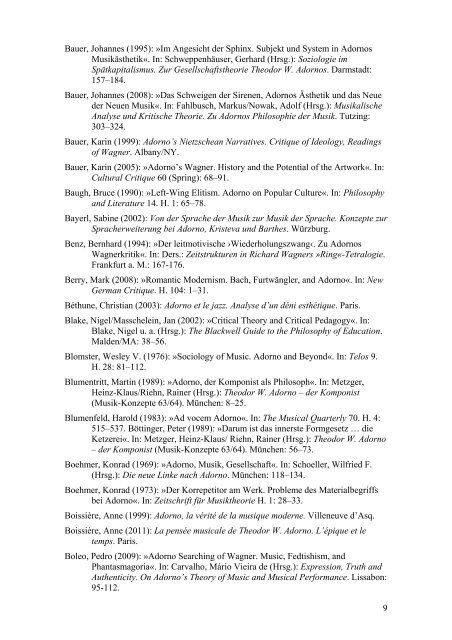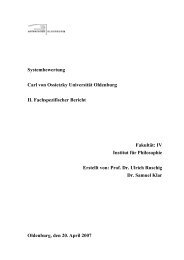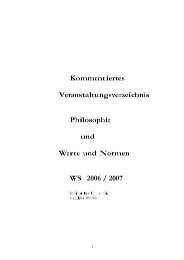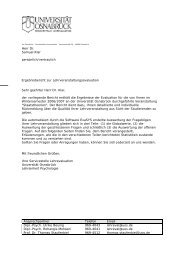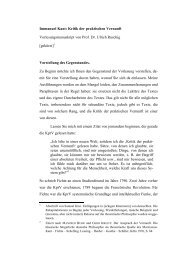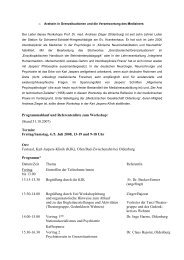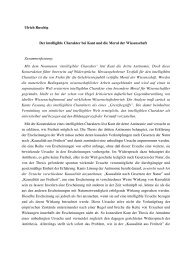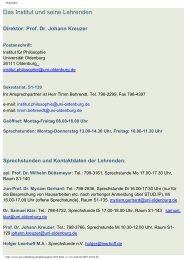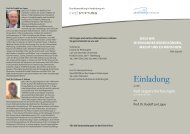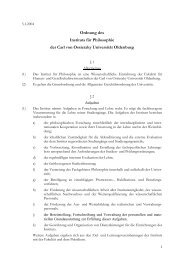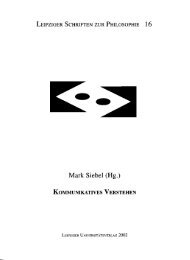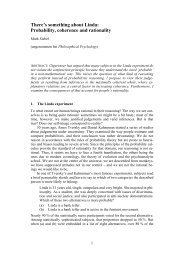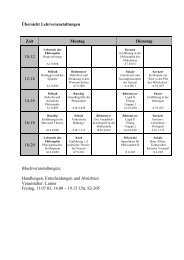Leben - Institut für Philosophie
Leben - Institut für Philosophie
Leben - Institut für Philosophie
Sie wollen auch ein ePaper? Erhöhen Sie die Reichweite Ihrer Titel.
YUMPU macht aus Druck-PDFs automatisch weboptimierte ePaper, die Google liebt.
Bauer, Johannes (1995): »Im Angesicht der Sphinx. Subjekt und System in Adornos<br />
Musikästhetik«. In: Schweppenhäuser, Gerhard (Hrsg.): Soziologie im<br />
Spätkapitalismus. Zur Gesellschaftstheorie Theodor W. Adornos. Darmstadt:<br />
157–184.<br />
Bauer, Johannes (2008): »Das Schweigen der Sirenen, Adornos Ästhetik und das Neue<br />
der Neuen Musik«. In: Fahlbusch, Markus/Nowak, Adolf (Hrsg.): Musikalische<br />
Analyse und Kritische Theorie. Zu Adornos <strong>Philosophie</strong> der Musik. Tutzing:<br />
303–324.<br />
Bauer, Karin (1999): Adorno’s Nietzschean Narratives. Critique of Ideology, Readings<br />
of Wagner. Albany/NY.<br />
Bauer, Karin (2005): »Adorno’s Wagner. History and the Potential of the Artwork«. In:<br />
Cultural Critique 60 (Spring): 68–91.<br />
Baugh, Bruce (1990): »Left-Wing Elitism. Adorno on Popular Culture«. In: Philosophy<br />
and Literature 14. H. 1: 65–78.<br />
Bayerl, Sabine (2002): Von der Sprache der Musik zur Musik der Sprache. Konzepte zur<br />
Spracherweiterung bei Adorno, Kristeva und Barthes. Würzburg.<br />
Benz, Bernhard (1994): »Der leitmotivische ›Wiederholungszwang‹. Zu Adornos<br />
Wagnerkritik«. In: Ders.: Zeitstrukturen in Richard Wagners »Ring«-Tetralogie.<br />
Frankfurt a. M.: 167-176.<br />
Berry, Mark (2008): »Romantic Modernism. Bach, Furtwängler, and Adorno«. In: New<br />
German Critique. H. 104: 1–31.<br />
Béthune, Christian (2003): Adorno et le jazz. Analyse d’un déni esthétique. Paris.<br />
Blake, Nigel/Masschelein, Jan (2002): »Critical Theory and Critical Pedagogy«. In:<br />
Blake, Nigel u. a. (Hrsg.): The Blackwell Guide to the Philosophy of Education.<br />
Malden/MA: 38–56.<br />
Blomster, Wesley V. (1976): »Sociology of Music. Adorno and Beyond«. In: Telos 9.<br />
H. 28: 81–112.<br />
Blumentritt, Martin (1989): »Adorno, der Komponist als Philosoph«. In: Metzger,<br />
Heinz-Klaus/Riehn, Rainer (Hrsg.): Theodor W. Adorno – der Komponist<br />
(Musik-Konzepte 63/64). München: 8–25.<br />
Blumenfeld, Harold (1983): »Ad vocem Adorno«. In: The Musical Quarterly 70. H. 4:<br />
515–537. Böttinger, Peter (1989): »Darum ist das innerste Formgesetz … die<br />
Ketzerei«. In: Metzger, Heinz-Klaus/ Riehn, Rainer (Hrsg.): Theodor W. Adorno<br />
– der Komponist (Musik-Konzepte 63/64). München: 56–73.<br />
Boehmer, Konrad (1969): »Adorno, Musik, Gesellschaft«. In: Schoeller, Wilfried F.<br />
(Hrsg.): Die neue Linke nach Adorno. München: 118–134.<br />
Boehmer, Konrad (1973): »Der Korrepetitor am Werk. Probleme des Materialbegriffs<br />
bei Adorno«. In: Zeitschrift <strong>für</strong> Musiktheorie H. 1: 28–33.<br />
Boissière, Anne (1999): Adorno, la vérité de la musique moderne. Villeneuve d’Asq.<br />
Boissière, Anne (2011): La pensée musicale de Theodor W. Adorno. L’épique et le<br />
temps. Paris.<br />
Boleo, Pedro (2009): »Adorno Searching of Wagner. Music, Fedtishism, and<br />
Phantasmagoria«. In: Carvalho, Mário Vieira de (Hrsg.): Expression, Truth and<br />
Authenticity. On Adorno’s Theory of Music and Musical Performance. Lissabon:<br />
95-112.<br />
9


